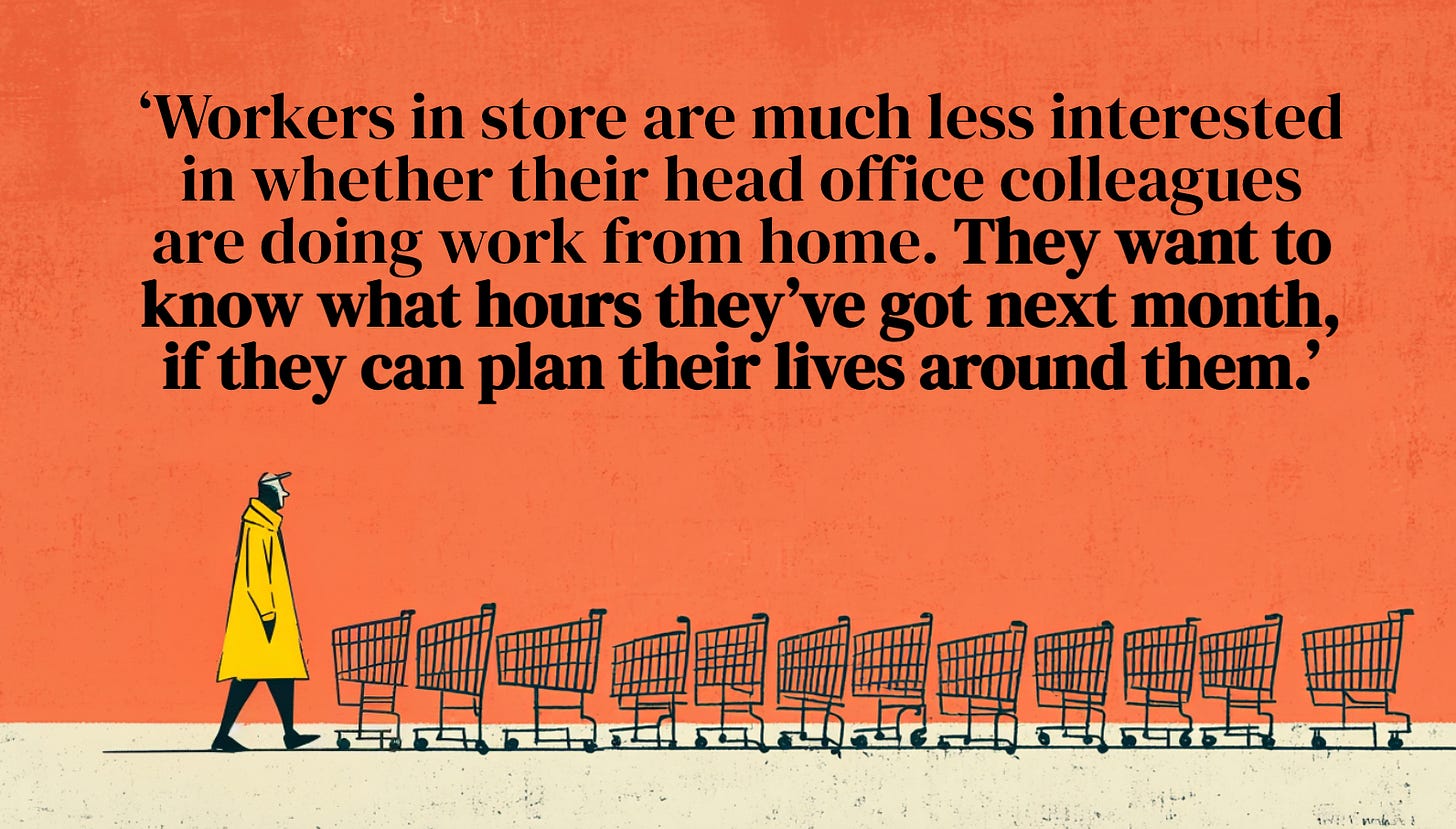Time to talk about wages
ALSO: most corporate training is virtue signalling admin
Anytime I’m asked which books I’d recommend on workplace culture, top of the list are the books by Zeynep Ton.
In The Case for Good Jobs she leads in to a story of one employer she was working with:
‘Low pay also undermines motivation and engagement. As organisational psychologists have shown us, what really engages and motivates employees is a sense of belonging, achievement, recognition, meaningfulness, and personal growth. When companies pay little and operate with high turnover, they end up making many interrelated decisions that hurt their ability to meet those needs. Management, seeing itself as saddled with a low-ability, easy-come-easy-go workforce, uses more and more top-down control to make up for employees’ individual skill, judgment, and dedication. That, of course, doesn’t develop belonging and achievement—it erodes them. Managers who are constantly fighting fires have no time or resources to provide feedback. That doesn’t develop career opportunities. As a worker, when you constantly worry about making ends meet, can’t focus on your job, fail in front of the customer every day, or feel that your time or abilities are not respected, it is hard to find meaning in your work—regardless of what the company’s purpose is or the social good it may actually do. I once met with leaders of a company that spent a lot of time and consulting resources to develop their mission. They wanted to feed the human spirit. During one of our calls when they kept talking about this mission, I asked how much their frontline employees were making. It was about $9 an hour.’
This week is Living Wage Week. In the UK there are 4.5 million jobs - or 1 in 6 jobs (16%) that are paid below the real Living Wage. Almost 6 in 10 (59%) workers paid below the real Living Wage reported skipping meals, turning off the heating, falling behind on bills or taking out a pay-day loan to cover essentials. Over 2 in 5 have used a food bank in the past year.
There are plenty of employers who willing to take a stand to say they will pay their workers enough money to live on. There are more than 16,000 accredited employers who are signed up to the Living Wage pledge. The pledge commits to paying £13.45 per hour (or £14.80 in London). The legal minimum wage is £10 for under-21 year olds and £12.21 for over 21s. In contrast the Living Wage is the pay level that independent experts have determined is the real cost of living in the UK.
The real Living Wage is worth over £2,400 more a year than the current minimum wage. This is equivalent to 7 months’ worth of food for a household or 4 months of housing and energy costs.
In 2024 the Living Wage Foundation reported that ‘The sector with the highest number of jobs paid below real Living Wage is the wholesale and retail sector, with more than a million low paid jobs’.
I spoke at a Retail Trust event last week and brought up the issue. There are many great employers in the space, Living Wage employers include Cook, IKEA, Uniqlo and LUSH but many of your favourite high street brands haven’t signed up to pay their employees a living wage.
I chatted to someone at the Foundation, they explained to me that many non-signatory employers do peg their pay grades to the Living Wage, but don’t sign up because they would be required to pay the same to their contracted suppliers like security guards and cleaners. These jobs are sometimes called ‘invisible jobs’ because those doing them have no chance of progressing, no career opportunities and don’t really figure in many people’s considerations. There’s not a lot of mattering for security guards or cleaners.
The Office for National Statistics observed a cluster of organisations paying around the real Living Wage (but not signing up) and attribute this to the success of the Living Wage campaign.
Last time I presented to the Retail Trust, one veteran of the industry put his hand up and told me that I needed to understand that one of the biggest issues in the space was that in-store employees were fed up with their office colleagues working from home a couple of times a week.
I expressed surprise at this, but I’ll always defer to the sector knowledge of an expert.
Afterwards a very experienced leader came over and told me that this was far from the truth. She said: ‘Workers in store are much less interested in whether their head office colleagues are doing work from home. They want to know what hours they’ve got next month, if they can plan their lives around them.’
I should have known it. A big bossman peddling horseshit to get the team back to the office.
I’m not sure the audience of the Retail Trust enjoyed me calling this out on my return last week.
Yes, by all means two or three days in the office is demonstrably effective for team cohesion but demanding four or five days in the office has the direct impact of making working mothers’ lives harder. (Sorry, it is gendered and it is inarguable in the data, no matter how inconvenient it is for leaders who want the band back together all the time).
You can either want diversity, or you can want your office minions surrounding you four or five days a week but you can’t have both).
This desire to have predictable hours is why the Living Wage Foundation have added a new part to their campaign, the Living Hours Pledge. A commitment that aims to balance flexibility with dependability. The simple offer of a minimum 16 hours a week to those who want them, and 4 week visibility of shifts. This isn’t fantasy employment terms in the world of retail, in fact it forms the basis of how the world’s biggest commercial employer Walmart have set to re-invent their workplace over the last few years (with the addition of a proper app that allows easy swapping of shifts with other employees, a hugely important need in the space).
Other things to know:
Workers paid the Living Wage are 1.7 times more likely to say their job has a positive impact on their physical health and 1.6 times more likely to say it positively affects their mental health, compared to low-paid workers
Three quarters (75%) of workers paid the Living Wage are satisfied with their current job, dropping to 61% for low-paid workers
75% of employers paying the Living Wage reported ‘increased motivation & retention’ of employees, 58% reported ‘improved relations between managers & staff
I’m utterly inspired by the work of the Living Wage Foundation, in the twenty years they’ve been operating they’ve put £4.2bn back into the pockets of frontline workers. Please do check out their work
Here are my slides from the presentation - click to view. There’s some commentary, but drop me a line if any of the slides need explaining
Most company training doesn’t change behaviour. It signals virtue, adds admin, and clogs the pipes.
That’s the show-stopping take of Andre Spicer and Mats Alvesson, who have written a new book The Art of Less about cutting out the dark matter that makes work miserable. They told me about how bureaucracy and admin has served to make work exhaustingly slow. With creeping initiative-itis slowly us dragging down.
The one thing that stayed with me was the discussion of culture as a gesture of grandiosity. That firms don’t just want a functioning operation, they want to create an aura of superiority or uniqueness to their culture.
Listen: Website / Apple / Spotify
Related to this week’s podcast, I was impressed with this new research by Perk, who tapped Forrester data to show that most workers are losing 7 hours a week to soul sapping admin. 45% of us believe this is contributing to feeling burned out
A YouTuber highlights the reality of slavery in Dubai, please check this out
I don’t tend to do other podcasts but I was happy to join a couple of friendly faces, Rachel Forde and Marco Bertozzi on their Mentor show:








